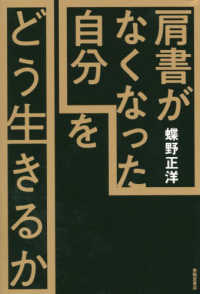- ホーム
- > 洋書
- > 英文書
- > Business / Economics
Full Description
Drawing on anthropology, historical sociology and social-epidemiology, this multidisciplinary book investigates how pharmaceuticals are produced, distributed, prescribed, (and) consumed, and regulated in order to construct a comprehensive understanding of the issues that drive (medicine) pharmaceutical markets in the Global South today.
Based on primary research conducted in Benin and Ghana, and additional data collected in Cambodia and the Ivory Coast, this volume uses artemisinin-based combination therapies (ACTs) against malaria as a central case study. It highlights the influence of the countries colonial and post-colonial history on their models for state regulation, production, and distribution, explores the determining role transnational actors as well as industries from the North but also and increasingly from the South play in influencing local pharmaceutical markets and looks at the behaviour of health care professionals and individuals. Stepping back, the authors then unpick the pharmaceuticalization process and the multiple regulations at stake by looking at the workings of, and linkages between, (biomedical health) pharmaceutical systems, (representatives of companies) industries, actors in private distribution, and consumer practices.
Providing a thorough comparative analysis of the advantages and disadvantages of different pharmaceutical systems, it is an important contribution to the literature on pharmaceutalization and the governance of medication. It is of interest to students, researchers and policy-makers interested in medical anthropology, the sociology of health and illness, global health, healthcare management and pharmacy.
The Open Access version of this book, available at http://www.taylorfrancis.com/books/9780429329517, has been made available under a Creative Commons Attribution-Non Commercial-No Derivatives 4.0 license.
Contents
Introduction-Pharmaceutical markets in the Global South: shaped by history and multiple regulations Part I. Varying choices for State regulation and their consequences 1.Strengthening national pharmaceutical regulation through local production 2.Strengths and weaknesses of State-controlled wholesale distribution: Benin's CAME and wholesaler-distributors 3.Distribution and access to medicines: role of the pharmacist monopoly 4.From depharmaceuticalization to drug abundance: a social history of pharmaceutic regulations in Cambodia Part II. Global and local markets of new antimalarials 5.A new geography of pharmaceuticals: trajectories of artemisinin-based medicines 6.Clashes between subsidized and private ACT markets: when administrative, Global Health, and marketing regulations collide 7.When the pharmaceutical system creates persistent attachments or new appropriations of drug molecules: divergent ACT distribution and use in Benin and Ghana 8.Standardized herbal medicines in Ghana: the construction of a substantial share of the medicine market, especially for malaria Part III. Pharmaceuticalization: medicines at the heart of health systems and societies 9.Pharmaceutical representative activities in Benin and Ghana: promoting firms while helping construct the pharmaceutical economy of African countries 10.Self-medication versus consultation: individual autonomy and dependence in health decisions 11.When subjective quality shapes the whole economy of pharmaceutical distribution and production. Conclusion-Rationalizing drug markets in the Global South: re-making medicines essential






